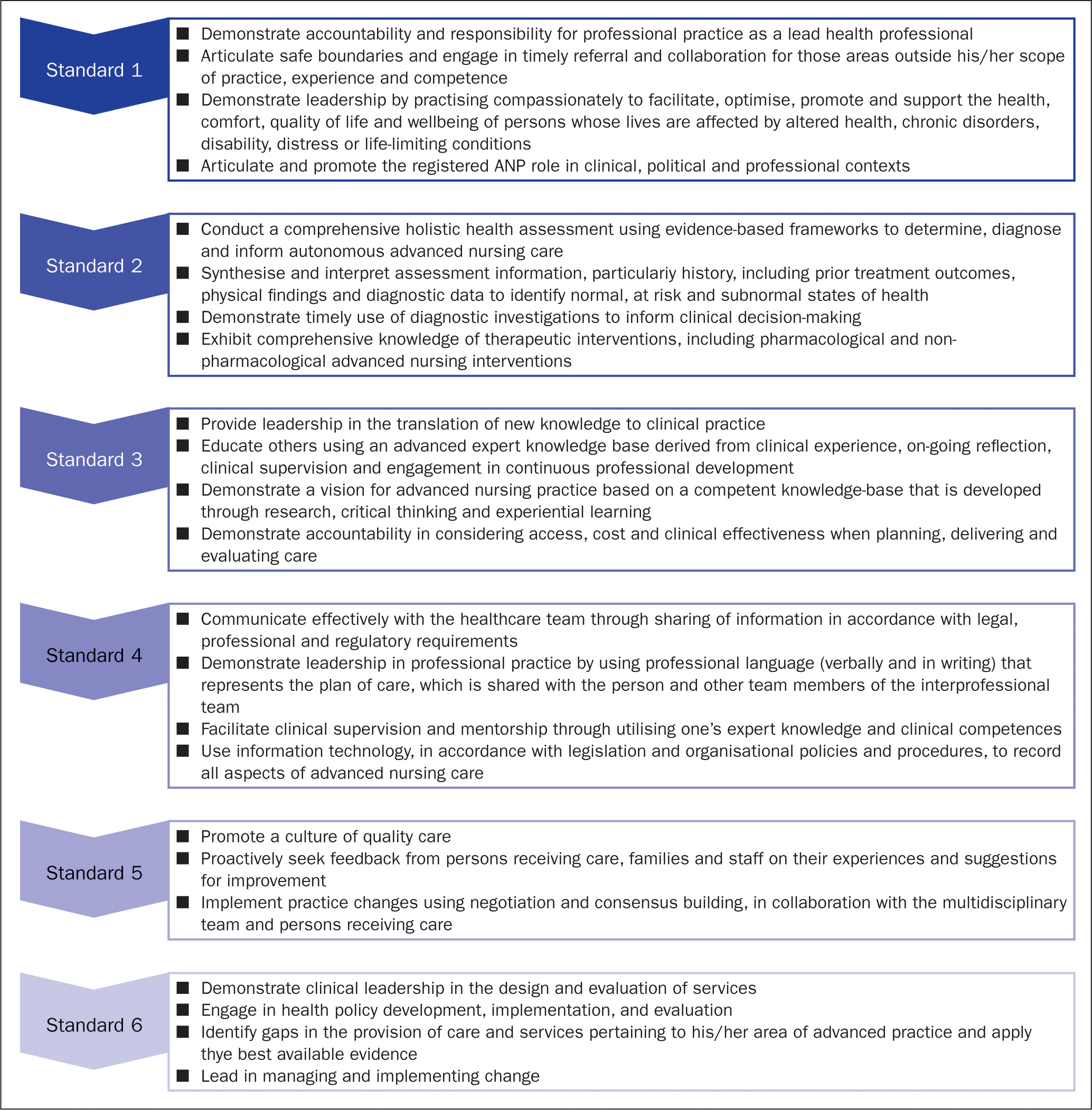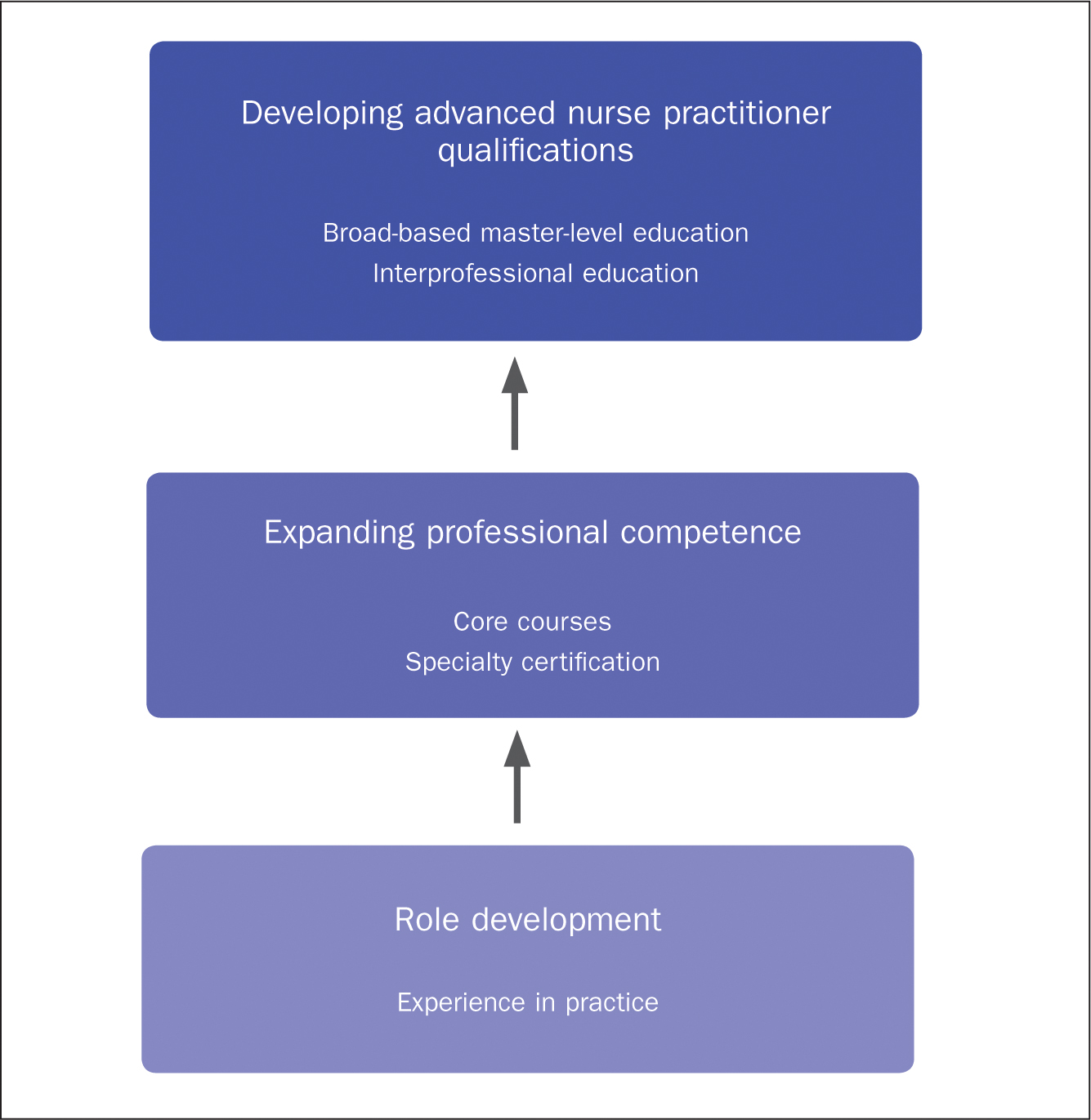Ireland has a government-funded healthcare system with means-tested access. Around 37% of the population has free access and the rest pay subsidised fees for elements of care, while some aspects are free for all. In addition, private costed healthcare services are available. There are special access systems for those with long-term conditions, to cover pregnancy, childbirth, children under 6 years, and those on long-term medications. There is an agenda of continuous improvement to the service. For example, the Report of the Commission on Nursing: a blueprint for the future (Government of Ireland, 1998) championed a complete revision of the structure of Irish nursing that included a recommendation for the establishment of advanced practice roles. The registered advanced nurse practitioner (ANP) role represents an important development within healthcare in Ireland. Currently 336 advanced practitioners are registered with the Nursing and Midwifery Board of Ireland (NMBI), working across more than 40 specialties (DoH, 2019). Significantly, the Health Service Executive (HSE), as provider of public health services in Ireland, has pledged to increase the number of ANPs in response to population demand and emerging service needs. Current integrated care service delivery is focused on addressing critical areas including older persons, chronic diseases, and unscheduled/scheduled care. The current planned workforce projection is in line with the current Irish Sláintecare strategy (a health reform plan) (DoH, 2017) and by 2021 it is proposed that there will be a total of 750 practising advanced practitioners in Ireland addressing population-based service needs (DoH, 2019).
Advanced nursing practice
Advanced nursing practice has been in existence internationally for over 50 years, with the USA spearheading developments in the 1960s (Begley et al, 2010). Many countries subsequently followed suit, including Australia (1995), the UK (1999), New Zealand and Canada (2000) and Ireland (2001) (Begley et al, 2010). Currently, more than 50 nations are recorded as formally providing advanced nursing practice. The International Council of Nurses (ICN) has defined the key attributes of an advanced practitioner as:
‘One who has acquired, through additional education, the expert knowledge base, complex decision-making skills and clinical competencies for expanded nursing practice.’
In the Irish context, registered ANPs' domains of practice (Figure 1) are identified in the Advanced Practice (Nursing) Standards and Requirements (NMBI, 2017:16).

Emanating from the six domains of practice, advanced practitioners are required to achieve the following competency standards:
Standard achievement is demonstrated by ‘cues’, which are defined as ‘key generic examples of competency performance’ (NMBI, 2017:16-19) as illustrated in Figure 2.

International evidence has identified advanced practitioners as having a beneficial impact on health service provision because of their specialist knowledge, wide scope of qualifications and their ability to provide a complete episode of care (Begley et al, 2010; Carney, 2016; Fealy et al, 2018; DoH, 2019). The concepts of accountability, higher-level decision-making and autonomy are synonymous with advanced practice, resulting in a unique nursing role in comparison with other frontline nurses.
Choosing an ANP role
Understanding why some nurses choose advanced practice roles is key to exploring commonalities that may influence a move into an advanced practice career trajectory. Are there aspects of previous clinical, managerial or educational experiences that influence nurses to opt for an advanced practice career pathway, or is it personality-based? Alternatively, could there be simply opportunistic, experiential or situational reasons for a nurse's choice? The multifaceted complexity of people and practice makes a definitive answer to this conundrum elusive. Nurses appear to have a myriad of personal, contextual and professional factors that motivate and influence their career pathways towards or away from advanced practice. Influencing factors can include contexts, events, status, capital, opportunities and barriers.
Pierre Bourdieu, a French philosopher, called this the ‘fuzzy logic of practice’ where actors are predisposed to see a course of action as obvious, when others may see it as impossible (Bourdieu, 1990). Fatalistic determinants of ‘being in the right place at the right time’ may be levied; however, the underlying reasons why a person is positioned to start on a particular course of action, counters the philosophical doctrine of fatalism. For example, other nurses may be in the same position, but do not opt for the advanced practitioner career trajectory. It is suggested that a combination of determining factors exist; however, O'Shea (2008) suggested that a driving force appears to come from within the nurses themselves as a desire to be based clinically close to the patient. It is important to develop this understanding as it can serve to inform and promote effective advanced practitioner recruitment, retention and role transitioning.
The journey to advanced nurse practitioner
Possible transitional passages experienced by nurses moving to advanced practice career pathways have been explored by Woods, 1999; Furlong and Smith, 2005; Jones, 2005; Duchscher, 2009; and Barnes, 2015. Following a 2-year pilot study, a revised educational pathway for attaining ANP status (Figure 3) was launched by the Irish DoH in July 2019. Key changes include a revised streamlined timeframe from graduate to advanced nursing and a broad-based masters' level education. A credentialing model is promoted that supports nurse capability progression and enables a nurse to become an ANP in a minimum of 2 years after registration, rather than the original pathway of 7 years (McGowan, 2019).

Applying concepts of role transitioning
Moving to an advanced practice role within a minimum of 2 years' post-registration has been supported by Casey et al's (2015) evidence review. This new model, however, places an increased emphasis to the promotion of effective role transitioning because previously nurses required a minimum of 7 years' experiential professional advancement before becoming a registered ANP (DoH, 2019). It will be interesting to review the impact of this new model on ANP recruitment, retention and role transitioning.
In the three-and-a-half decades since Benner's (1984) seminal work From Novice to Expert was published, debate has continued regarding nurses' professional transitional journeys. Benner theorised that nurses undergo a series of transitional phases throughout their nursing journey, and a possible career trajectory is from novice to expert. As a result of her study, she suggested that nurses may progress through five stages of skills acquisition: novice, advanced beginner, competent, proficient and expert. It is now recognised that this professional advancement model is not always linear and is context specific, as, for example, when an expert moves to a new specialism and has to develop new skills. This scenario brings into question whether advanced practice continuums of novice to expert may differentiate into additional advanced practice levels as Benner suggested. Rather it may be that new skills are easier to acquire because of the nurse's previous experience.
Woods' (1999) longitudinal research discovered that three discrete stages mark the transitional processes when journeying into advanced practice roles. He termed these sequential stages: idealism of reconstruction, organisational governance and resolution. Resolution signals a levelling where advanced practitioners accept organisationally imposed role limitations and work within the pre-negotiated parameters. A recent editorial by Corbally and Lees-Deutsch (2019) questions current perspectives regarding advanced practitioner resolution.
The focus is on how ‘support-scaffolding’ for advanced practitioners could augment successful role development and optimise recruitment and retention practises for advanced practitioners. This is key if the proposed critical mass of 750 advanced practitioners is to be achievable and sustainable by 2021.
ANPs' community of practice: the development of a shared professional identity
Role theory, theories of socialisation and communities of practice provide some underpinning theoretical reasoning why transitional processes are influenced by, and in turn influence, the development of a shared professional identity (Habermas, 1984; Bourdieu, 1990). ANPs' candidacy model includes clinically based experiential learning to an equivalent of 500 hours and a broad-based masters-level education (Figure 3). Socialisation to cultures and norms of a nurse's role occurs through exposure to formal and informal education in nursing practice environments (Johnson et al, 2012; ten Hoeve et al, 2014). Experiential learning actively supports professional identity development by promoting role modelling and mentorship for ANP candidates to learn their artistry, craft, knowledge, skills and clinical wisdom A shared professional identity within ANPs' communities of practice enables collective awareness of values and practices inherent in the advanced practitioner role. Replication emerges as candidates transition and flourish into registered ANPs.
ANPs reconstruct their professional selves as higher-level advanced practitioners influenced by a multiplicity of factors. Social theorists, including Habermas (1984) and Bourdieu (1990), considered personal and professional transitions to be individualistic processes. However, a change in occupation or role is an example of a transitory experience that involves alterations in a person's perceived sense of self. Learning the art and science of a new advanced practice nursing role involves situational, personal, professional and cultural change. According to Bourdieu (1990: 108), experiences of harmony or disharmony in situations of transition are analogous to ‘the fish in water’ or ‘the fish out of water’ experience. ANPs' perceptions of themselves, and how they perceive other clinicians view them, has a significant impact on their role-identity formation, with a potential for professional transitional shock occurring. Transitioning is a period of change where dispositions alter, looking at these changes enables insight into the ‘fuzzy logic of practice’ (Bourdieu, 1990).
Organisational, clinical and educational support-scaffolding to augment transitional passageways
Kennedy et al (2012) suggested that transitional ‘support scaffolding’ may help in the process of advanced practitioner role transitioning, as a deconstruction of their former role takes place simultaneously with a reconstruction of their new identity. This can then be used to feed-forward for those facilitating ANP programmes to promote the development of support-scaffolding through the formation of formal and informal mentoring, and group networking, to augment smooth transitional passageways, from nurse to candidate ANP, and from candidate to registered ANP. A preceptorship model between an experienced expert ANP and a novice ANP that enables frequent contact, evaluations and positive reinforcement, may protect against possible feelings of isolation, enhance professional advancement and build confidence. Promoting social-scaffolding networking may champion effective communication channels to develop a sense of unity, promote shared collegial support and enhance professional advancement of advanced nursing practice.
Conclusion
Advanced nursing practice in the Republic of Ireland is changing, as more nurses are expected to work at an advanced level in the future with the educational journey for ANPs shortened from 7 to 2 years post-registration. Promotion and development of networks to support nurses, working in or towards advanced practice roles, could be enhanced with advanced nurse practitioner, nurse educator and practice development coordinators' involvement.

